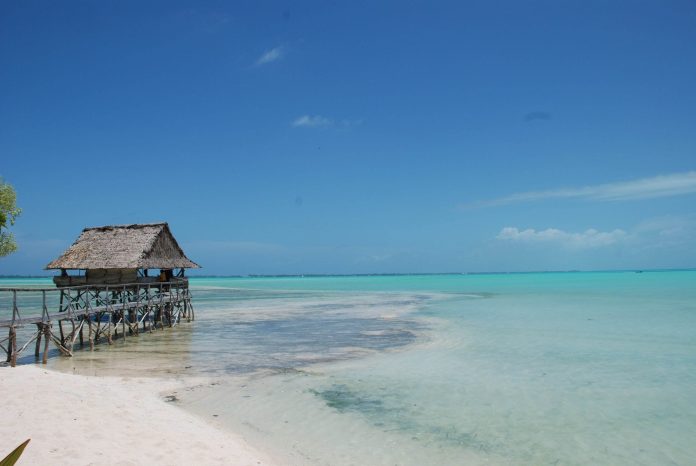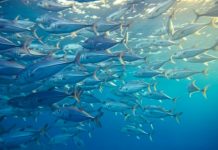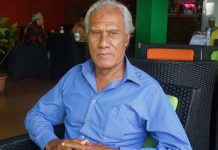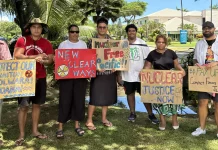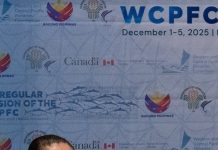By Nic Maclellan in Rarotonga, Cook Islands
As the region faces an El Nino summer and Vanuatu reels from the devastation of Cyclone Lola – the third Category 5 cyclone to hit the nation in seven months – it’s no surprise that climate change is high on the agenda at this year’s Pacific Islands Forum.
Prime Ministers and Presidents from Forum member countries are arriving in Rarotonga, Cook Islands, for their annual summit between 6-10 November. They will discuss new initiatives on climate finance, including the creation of a Pacific Resilience Facility and a new global fund to respond to the loss and damage caused by recent climate disasters.
Pacific governments are also gearing up for the 28th Conference of the Parties of the UN Framework Convention on Climate Change (COP28) in the United Arab Emirates, which starts on 30 November. The Rarotonga meeting will also discuss Australia’s bid to host COP31 in 2026, in partnership with Pacific states.
Under Prime Minister Fiamē Naomi Mata’afa, Sāmoa currently serves as chair of the Alliance of Small Island States (AOSIS). Throughout the year, Sāmoa’s UN Ambassador Fatumanava-o-Upolu III Dr Pa’olelei Luteru has led the AOSIS charge at the United Nations on emissions targets, climate finance and new measures to measure human development and environmental security, such as a Multi-Dimensional Vulnerability Index (MVI).
At a recent preparatory meeting, Sāmoa’s representative stressed: “COP28 must send a clear message to phase out fossil fuel use, end fossil fuel subsidies and scale up renewables. We can’t afford for the COP28 decision to imply the acceptance of fossil fuel expansion when we know that expansion can’t be compatible with a 1.5C future.”
A fossil free region
Will Forum Island leaders stand strong in Rarotonga to defend and advance this long-standing regional priority?
Each year, there are calls for the largest Forum member Australia to rapidly reduce coal exports, end fossil fuel subsidies to mining companies and divert these resources for renewable energy investment.
However, while visiting Canberra on a state visit last month, Fiji Prime Minister Sitiveni Rabuka angered climate justice activists by suggesting that the Pacific take a “realistic” approach towards Australian coal mining and gas production (Rabuka is a repeat offender, with previous offhand comments undercutting Forum messaging on Japan’s ocean dumping of treated nuclear wastewater).
The Pacific Islands Climate Action Network (PICAN) criticised Rabuka’s comments as “particularly surprising in light of Fiji’s recent support for the ‘Port Vila Call for a Just Transition towards a Fossil Fuel-Free Pacific’. These recent remarks also call into question its role as a ‘friend’ of the Beyond Oil and Gas Alliance whose membership boasts some of the most progressive voices calling for the phase-out of coal, oil and gas production in international climate dialogues.”
Last March, six Forum Island Countries issued the Port Vila Call to Action, pledging to work towards a global, equitable phase-out of coal, oil and gas. In May, the Pacific Regional Energy and Transport Ministers’ Meeting issued a call for Forum leaders to formally endorse the Port Vila agenda at this week’s summit in Rarotonga.
Since the May 2022 election of his Labor government, Australian Prime Minister Anthony Albanese has strengthened emissions reductions targets. He is also working to hose down regional doubts about Canberra’s climate policy – a bitter legacy from previous Coalition governments. However, there is widespread criticism that the ALP government’s “net zero by 2050 pledge” is not enough, given that global emissions are already driving temperatures beyond the symbolic “1.5 to stay alive.”
Writing to Forum Island leaders in August, the Australian Greens party noted that the Albanese government has opened 10 new gas fields for development, invested in a new gas export terminal for the Beetaloo gas fields and approved three new coal mine extensions that will operate for decades – all measures that threaten Australia’s long term emissions reduction targets.
Pacific climate diplomacy
Worried about foot-dragging by OECD countries at the annual global climate negotiations, church and community groups will mobilise this week in Rarotonga to press government delegations to move ahead with other innovative actions around climate change.
Civil society advocates have supported the work of Marshall Islands and Solomon Islands at the International Maritime Organisation (IMO), seeking to establish a levy on shipping emissions. USP law students at the Emalus campus in Port Vila inspired Vanuatu’s successful campaign to pass a resolution through the UN General Assembly, seeking an advisory opinion from the International Court of Justice (ICJ) on state obligations around human rights, environment and climate change.
Pacific countries are also a driving force in current negotiations on Loss and Damage, to respond to unavoidable risks of climate change like cyclone damage, rising sea levels, prolonged heatwaves or the acidification of the oceans.
At last week’s meeting of the Loss and Damage Transitional Committee, Canberra joined Washington and other Western capitals to argue that a new finance facility should be housed in the World Bank. At COP28, AOSIS and other developing country delegates will continue to push for an independent structure, angered that the US-dominated multilateral bank might use loans to allocate funds to cope with human-induced climate disasters.
A statement issued by Pacific Elders Voice on 2 November highlights this concern. The Pacific Elders – a network of former Presidents, Prime Ministers, diplomats and scholars from around the region – noted that “an effective, fair and transparent Loss and Damage mechanism where countries that caused the climate crisis pay for the damage that they have inflicted on our planet is crucial.”
The Elders express concern that “Australia has failed to represent Pacific interests through its advocacy as a member of the Loss and Damage Transitional Committee, by its opposition to the fund being part of the UNFCCC and arguing for the World Bank instead, as well as setting a financial goal for the fund. This goes against Pacific interests, which is part of the Alliance of Small Island States (AOSIS), currently chaired by Samoa. AOSIS has been clear that the fund must not be part of the World Bank.”
Australia to host COP31?
This week’s summit will also feature further discussion on Australia’s bid to host the 2026 UNFCCC Conference of the Parties (COP31).
Forum island leaders have already endorsed the COP31 bid. At a Special leaders retreat last February, they agreed that a global summit in the region was “a unique and unparalleled opportunity to elevate global climate ambition and to showcase and progress Pacific priorities.”
Despite this, there is widespread unease about the bid amongst civil society and environment groups, worried that the COP bid will overshadow Australia’s role as one of the world’s significant exporters of fossil fuels.
Calling for stronger Australian commitments on climate emissions and an end to new oil and gas projects, a PICAN statement said: “Pacific nations must carefully consider the implications of lending their early support to Australia’s bid. Pacific nations must make their support contingent on Australia’s track record and commitment to climate action on a global scale. While we acknowledge Australia’s aspiration to lead in hosting COP31, Pacific governments must seek tangible evidence of Australia’s dedication to substantial climate action, especially with regard to fossil fuels.”
Pacific Elders like former Presidents Hilda Heine of Marshall Islands, Tommy Remengesau Jr of Palau and Anote Tong of Kiribati, joined by former Forum Secretary General Dame Meg Taylor and former Tuvalu Prime Minister Enele Sopoaga, have also called for the deferral of a decision on COP31.
“We maintain our position that the endorsement of co-hosting Australia’s COP31 with the Pacific be conditional on greater climate action and provision of greater new and additional climate finance. While we recognise that co-hosting would enhance the voices of small island states that have been consistently held back from opportunities on the global stage, we feel that this decision should be postponed to a later Forum meeting.”
Earlier this year, Tuvalu’s Finance Minister Seve Paeniu said the COP31 bid was an opportunity for the Australian government to raise its ambition on the fossil fuel transition.
“We would like to support Australia’s bid to host COP31,” Paeniu said. “But we have expressed our expectation that we would only agree to the notion of framing as a ‘Pacific COP’ if Australia were to come on board and support the priorities of the Pacific on climate change – this is inclusive of fossil fuels, doing away with subsidies, stopped issuing new licences for further fossil fuel production, coal mines and so forth and a commitment over time to reduce the consumption of coal and other fossil fuels, in line with the 1.5° pathway.”
With financial support from Australia, the Forum has appointed new Climate Champions to carry Pacific voices into the next global climate talks. Cook Islands Prime Minister Mark Brown has responsibility for advocacy about the UNFCCC Global Stocktake, Tonga’s Prime Minister Siaosi ‘Ofakivahafolau Sovaleni takes the lead on Climate Finance, while Vanuatu’s Climate Minister Ralph Regenvanu will campaign on Loss and Damage.
As Forum Chair Mark Brown takes the lead on the stocktake of the 2015 Paris Agreement, the host government will be pushing for greater access to global and regional financing initiatives.
Wayne King, Director of Climate Change in the Office of the Prime Minister in the Cook Islands, says: “If we look back, countries have not done enough to rein in emissions – and access to finance has been even worse. The World Bank and all those guys need major reform. We need a course correction.”
Seeking climate finance
This week’s summit will focus extensively on climate finance and Mafalda Duarte, the newly appointed Executive Director of the Green Climate Fund (GCF), is scheduled to arrive in Rarotonga on Wednesday.
Australia’s Special Envoy to the Pacific Ewen McDonald used to serve as GCF co-chair, until the former Coalition government withdrew from the GCF Board, refusing any further funding. Last month, Foreign Minister Penny Wong announced that Australia would rejoin the GCF and make a “modest contribution” to the global climate finance mechanism, the first new commitment from Canberra since the first round of GCF pledging in 2014.
Small Island Developing States are desperately seeking new financial and technical resources for adaptation and Loss and Damage. But OECD nations have fallen short on the Paris Agreement on Climate Change climate finance targets (US$100 billion of private and public funds each year for developing countries by 2020 – a target the major powers failed to meet). This global target must be increased after 2025, but today significant resources are being diverted to address conflicts in Europe and the Middle East. There’s growing anxiety amongst poorer nations that the climate agenda will lose traction at a time of geopolitical polarisation.
Even before they set new targets, Forum members are eager to see OECD nations follow through on previous pledges. At President Joe Biden’s Leaders’ Summit on Climate Action in April 2021, he said “the United States intends to double by 2024 our annual public climate finance to developing countries and…intends to triple its adaptation finance by 2024. The Biden Administration will work closely with Congress to meet these goals.”
However, the narrow Republican majority in the US House of Representatives has repeatedly derailed Biden’s pledge, refusing to allocate significant new climate funding for developing nations in recent budgets. Even before the latest chaos in Washington, with the unprecedented sacking of House Speaker Kevin McCarthy by his own party, Pacific leaders have been looking anxiously at the polarised politics in the United States.
For Cook Islands climate adviser Wayne King, “it’s time for the Pacific Islands to voice what they believe is right for the region and for themselves, not as others dictate to us.”
“Development partners like the United States have got a different view of the world than we do, obviously,” he said. “They’re embroiled in two wars right at this moment, so priorities are changing rapidly – and they have an election next year. So, they may dramatically change the way they see things if politically they change, and that has an impact in our region.”
Throughout 2024, the political elite in Washington will be consumed by the Presidential elections. President Biden and Donald J. Trump are currently the frontrunners for the Democratic and Republican parties, and there is uncertainty about the final outcome, given Biden’s age and Trump’s long list of felony indictments.
Many people remember Trumps’s record of climate denial as President after 2016 – withdrawing from the Paris Agreement and refusing to fulfill the Obama administration’s previous pledge of US$3 billion funding for the Green Climate Fund (only $1 billion of the pledge was transferred before Obama left office, and Trump refused all further payments to the GCF).
Climate funds for the region
Despite all these dramas, the global climate mechanism has continued to fund a range of initiatives, including for the Pacific. On 25 October, the GCF Board approved another US$736 million for 15 projects around the world. In one initiative, Papua New Guinea, Vanuatu and Timor will join ASEAN states in a Community Resilience Partnership Programme (CRPP), to scale-up adaptation measures that link climate change, poverty, and gender inequality.
At the previous GCF Board meeting in July, other Forum Island country projects were endorsed. The Board approved a US$10 million Ecosystem-based Adaptation project, incorporating small-grant facilities, for the Federated States of Micronesia, Marshall Islands, and Palau. Another initiative, worth nearly US$32 million, provides funds for a Solomon Islands Knowledge-Action-Sustainability for Resilient Villages (SOLKAS) project.
Foreign Minister Penny Wong has now announced that “Australia will fund climate finance experts in eight Pacific Island countries. These are people who can work with those countries to access climate finance through funds such as the World Bank, the Asian Development Bank, the Green Climate Fund.”
Despite these allocations, many Small Island Developing States continue to raise concern about bureaucratic systems and capacity constraints that limit access to the global mechanism.
In response to these challenges, this week’s summit will also discuss the Pacific Resilience Facility (PRF) – a new regional mechanism to coordinate spending on climate adaptation, resilience and loss and damage.
After many years of technical development, a scheduled pledging conference for donors to commit funds to PRF was delayed during the Covid pandemic. Since then, the regional funding mechanism has been redesigned and tailored to meet the diverse interests of Forum member countries. This year’s Forum Finance Ministers Meeting endorsed the new initiative, and a number of donors that were originally wary of the idea have come on board, including Australia and the United States. This week, Forum leaders will be asked to consider and adopt a legal declaration to establish the PRF, opening the way for better regional coordination on climate finance.
SOURCE: ISLANDS BUSINESS/PACNEWS






